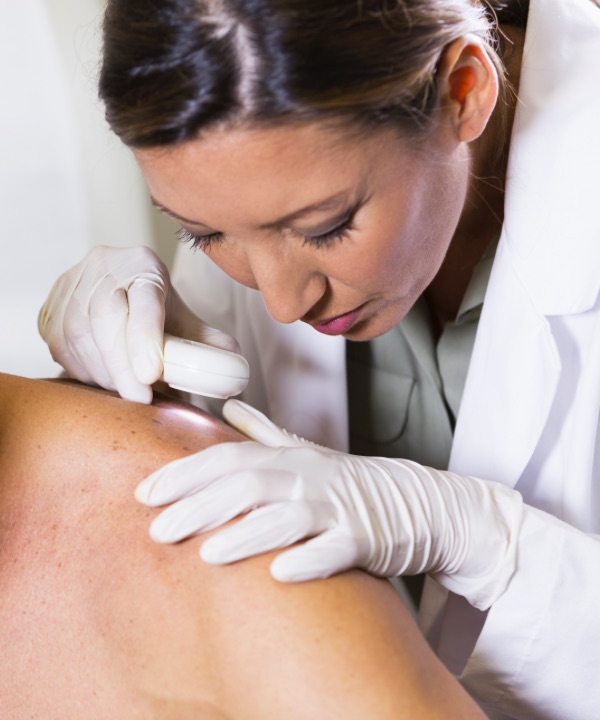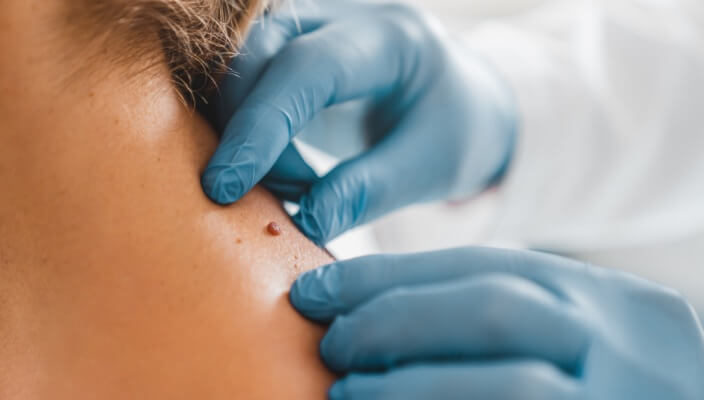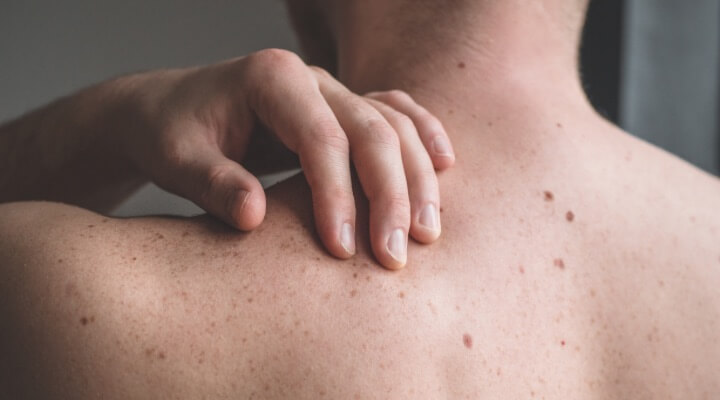Skin Biopsies: What You Need To Know
Why would I need a skin biopsy?
 Our team of dermatology providers are very familiar with all skin cancers and how to treat them. During your routine annual skin cancer screening, your dermatologist might feel that you have a suspicious mole or place on your skin where they want to perform a skin biopsy.
Our team of dermatology providers are very familiar with all skin cancers and how to treat them. During your routine annual skin cancer screening, your dermatologist might feel that you have a suspicious mole or place on your skin where they want to perform a skin biopsy. We wanted to share with you the different types of biopsies we routinely do to get the most accurate results.
What is a biopsy?
A biopsy is a removal of a sample of skin. That skin is then reviewed under a microscope and tested for skin cancer. If skin cancer does exist, a biopsy will also give the dermatologist a better understanding of which type of skin cancer it is and how deep the tumor is.
What are the different types of skin biopsies?
Our dermatologists perform three main types of biopsies to diagnose skin cancer. They are:
- Shave biopsy
- Punch biopsy
- Excisional biopsy
The type of biopsy your dermatologist chooses to perform depends on multiple factors. This reasoning can be related to their suspicions of what type of skin cancer it is and how deep they suspect it might be.
Let’s examine each of these types of skin biopsies in more detail.
Shave Biopsy
Punch Biopsy
Excisional Biopsy
What can I expect during a skin biopsy?
Most skin biopsies are done right there at the dermatology clinic. Here are some common steps we take to prepare you for a skin biopsy:
First, we clean the area where the biopsy will take place.
Next, we anesthetize the area where the biopsy will take place with a fine needle. We do this because we want the procedure to be entirely pain-free for our patients.
The anesthetic we use is usually lidocaine, which will completely numb the area affected by the biopsy. Depending on the patient and the circumstance, we can apply a topical anesthetic before the procedure to further aid in potential pain post-procedure.
Once we perform the biopsy, the dermatologist can do a variety of things to stop the bleeding, involving either ointments or a small instrument that can give the area an electrical zap to cauterize the wound, to prevent it from bleeding
Some biopsies will require a stitch or two, which is performed right at the dermatology clinic.
Hopefully, this detailed information about the different types of skin biopsies will educate you on what to expect, comfort your potential fears, and arm you with knowledge so you can have peace of mind.

Healthy Skin Starts at Cumberland Skin
Are you showing signs of possible skin cancer and need a professional evaluation? Get in touch with one of our board-certified dermatologists for a complete skin examination, diagnosis, and treatment recommendation. We’re ready to help you achieve happy, healthy skin! Cumberland Skin provides effective, compassionate general dermatology, skin cancer surgery, and cosmetic dermatology solutions for our patients throughout the Southeast.
Featured Products

iS Clinical Extreme Protect SPF 40
Extreme Protect SPF 40 is a multilevel environmentally protective treatment formula featuring our proprietary Extremozyme® technology combined with scientifically advanced all-physical sunscreen actives; transparent micronized Zinc Oxide and transparent micronized Titanium Dioxide. This antioxidant-rich state-of-the-art broad spectrum UVA/UVB sunscreen helps support optimal skin health as it moisturizes and protects. 100 g e Net wt. 3.5 oz.

SkinCeuticals Discoloration Defense
Discoloration Defense is a layerable, daily-use dark spot corrector clinically proven to reduce the appearance of key types of skin discoloration, including hard-to-treat forms such as stubborn brown patches and post-acne marks. This latest-generation formula improves the appearance of skin discoloration, brightens skin, and evens skin tone in as early as two weeks. 1 fl oz / 30 mL
Related Blog Posts

- Skin Cancer
- Sun Safety
Summer safety is more than just putting on sunscreen; many other factors to consider when keeping yourself and your children safe from damage and potential skin cancer.

- Skin Cancer
- Skin Exams
With skin cancer cases rising year after year, it’s no surprise that people are itching to learn more about this life-threatening skin disease
Read More
- Skin Cancer
- Skin Exams
It’s time to face the facts: skin cancer can develop in individuals of all skin colors, including those with darker skin tones.
Read More


